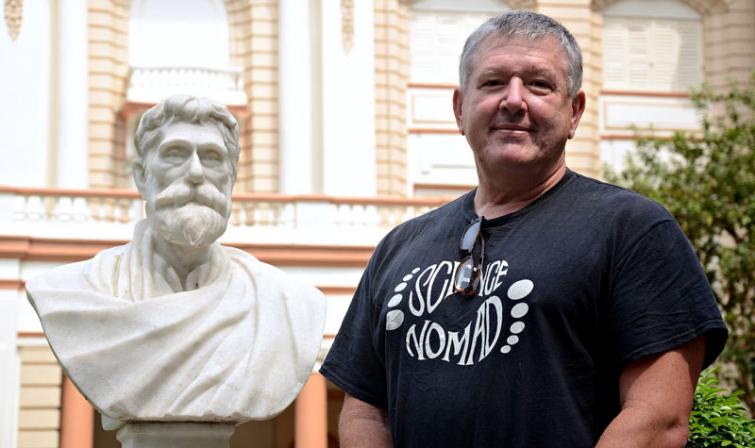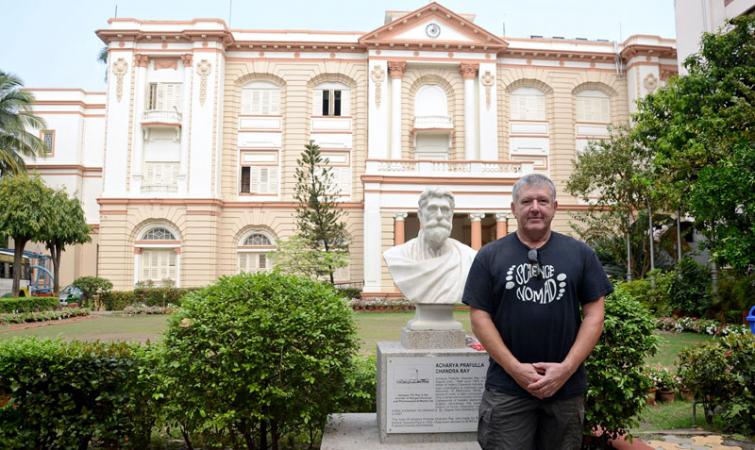
Students must be provoked to keep up their motivation in mathematics: Dr. Stuart Kohlhagen
Dr Stuart Kohlhagen, the senior Fellow of Science and Learning at Questacon (Australia’s National Science and Technology Centre), was present at a workshop in Kolkata recently. In an exclusive interaction with IBNS correspondent Souvik Ghosh, Dr. Kohlhagen spoke about some of the ways which must be devised to motivate students in mathematics
Often students get intimidated by Mathematics. Can you tell us any way to come of out this phobia?
This is a global problem. The Indian students by and large recognise the importance of mathematics and at least start with an interest. The challenge is how to keep the motivation going. There are some mathematics which are hard and there we need motivation which comes internally. Only parents asking their children to do better doesn't help. To keep students engaged into mathematics, certain ways need to be devised. For educators, one of the strategies is to make students share their problems with their classmates once they get exposed to the topic. These are the strategies and provocations, which if introduced, will help students.
Do you think curriculum needs to be modified too?
Undoubtedly changes in the curriculum would be a great advantage. The only problem in large countries is the inertia in changing curriculum. Changing curriculum needs redeveloping curriculum documents, retrain teachers, roll-out the resources. This is beneficial but a slow process. So certain 21st century skills needs to be developed and a change has to be brought in the way of doing the work. A student will stop thinking if he is told by his teacher. But the same student will start thinking if he is asked. If the student comes up with his own questions after he is asked, he will never stop thinking. So that is the hierarchy to get a powerful learning. Undoubtedly a teacher will have to provide the basic knowledge but if the students reach a point where they can ask their own questions then they will engage with the subject in a more powerful way. The simplest thing is to spend a little bit of time in introducing these sorts of provocations. The curiosity and engagement that come from those small times will help them through the rest of the lesson even if nothing else is changed in the lesson.

How do you think India is developing in science and technology?
India has got a significant advantage and opportunity. The advantage is its culture of valuing education and seeing it as a pathway to self as well as societal improvement. One of the other assets India has is the strength in English language which allows interactions between researchers and students who study overseas. So an Indian student is globally connected. Having that flexibility in mindset and being able to work in cross-disciplines is really where the opportunities lie. India recognises that. I have always found Indians as culturally resourceful and the gateway of future is on how the resources will be harnessed with the kind of emerging technologies.
We are seeing digitisation in India. How far do you think people of the country effectively use technology?
There are two modes of technology (users) - one is consumer and the other is developer, creator, master of technology. Again this is not a uniquely Indian situation but India is becoming a younger demography. People who consume digital technology are not necessarily the master of it or have the depth of understanding. Using social media and its privacy is one form of digital literacy. But actually understanding of the development of system according to needs is far from common among the consumers.
Digital technology is pervasive but doing so actually changes the value of information. Knowing something now is less of a specific skill. What question he is asking and what he does with the information is the thing. So the value has shifted from knowing and remembering to the ability to filter what is important, find innovation and application and recombine information. That is a different skill set. These things are not specifically in schools. So introducing these kind of problem solving, open-ended inquiry and investigation which can still be applied to the current topics will develop these additional skills. That will greatly benefit India in going into the future.
(Images by Avishek Mitra/IBNS)
Support Our Journalism
We cannot do without you.. your contribution supports unbiased journalism
IBNS is not driven by any ism- not wokeism, not racism, not skewed secularism, not hyper right-wing or left liberal ideals, nor by any hardline religious beliefs or hyper nationalism. We want to serve you good old objective news, as they are. We do not judge or preach. We let people decide for themselves. We only try to present factual and well-sourced news.







